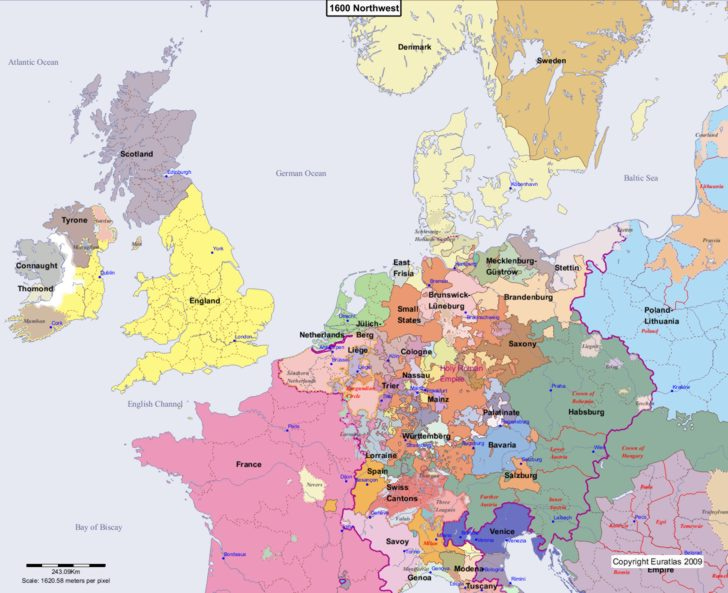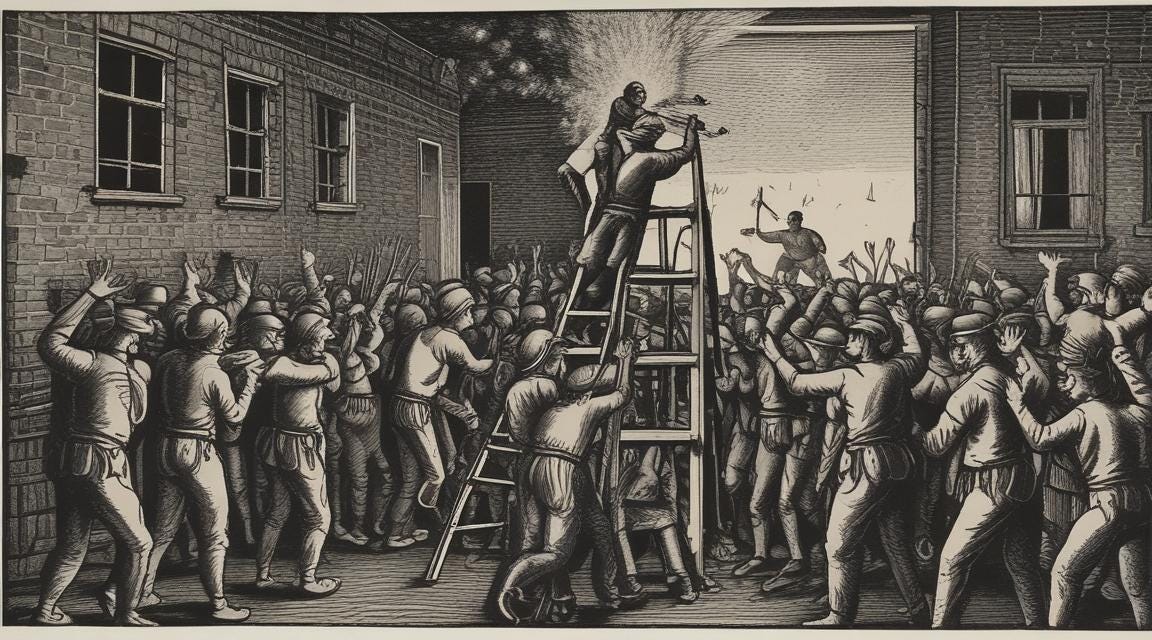The Fallacy of ‘Local Control’
Warnings from the Beatles, the Austrian School, Ayn Rand, & the Gospels
“You say you want a devolution? Well, you know …”
My apologies to John Lennon for tweaking his lyric, but it’s a wise bit of restraint to ponder.
In the lyrics of Lennon-penned Beatles classic, “Revolution,” the speaker doesn’t support the status quo, but also warns the revolutionaries that change can be worse (or, at least, still not good).
Revolutions don’t solve the underlying problem as much as they put new people in charge of maintaining the problematic apparatus of government.
The same can be said of devolutions, in which government power moves away from large-scale centralization and toward smaller jurisdictions.
Decentralization, secession, & where the fallacy emerges
The late Ralph Raico wrote extensively about “Europe’s radical decentralization” as the most logical, evidence-based explanation for how European societies first escaped the “Malthusian trap” of subsistence-level standards of living for most inhabitants in past centuries.

Other historians from the Austrian School of economics also saw the benefits of political fragmentation. Ludwig von Mises supported independence movements, writing in his early work, Liberalism:
However, the right of self-determination of which we speak is not the right of self-determination of nations, but rather the right of self-determination of the inhabitants of every territory large enough to form an independent administrative unit. If it were in any way possible to grant this right of self-determination to every individual person, it would have to be done.
Mises’ student Murray Rothbard built upon that understanding. The book, Breaking Away: The Case for Secession, Radical Decentralization, and Smaller Polities, especially Chapter 5: “Secession as a Path to Self-Determination”, succinctly summarizes Rothbard’s position:
Rothbard pushed secession for two main reasons: First, he regarded it as a useful tactic in moving toward his ideal of maximum individual freedom. Second, even when this ideal is not achieved, decentralization is valuable because smaller states are less able to exercise monopoly power than large states.
Breaking Away does admit, however, “secession in itself does not guarantee more freedom to the inhabitants of the new, smaller jurisdiction.”
Students of U.S. history know this, because the Civil War was spurred, in part, by the desire of Southern officials to assert “States’ rights” to maintain chattel slavery, which is about as contra-freedom as you can get!
Similarly, the phenomenon of Pull Him/Her Down (PHD) Syndrome* has been documented in modern societies that organize along rural, tribal lines. This form of “malicious envy” is enforced by local, bloodline-influenced, social orders.
And as the fascist, anti-science #COVIDHoax showed, some of the worst behavior in the U.S. came from state, county and municipal — local! — officials and enforcers, rather than from the national level. And they often encouraged your family, friends, and community members to help violate you through “snitch lines” and other intrusive tactics.
Coercive civil authority is inherently, intrinsically evil. The core problem is with this type of social order, regardless of the degree of size and scope. Locating the core problem of evil in the size/scope is a glaring fallacy!
The Gospels & others who’ve answered the call
Praxeologists like Raico, Mises and Rothbard understand the move away from big, intrusive governments is valuable because it’s a move toward the individual, in whom all natural human rights reside.
The most famous objectivist philosopher and novelist, Ayn Rand, also recognized the importance of respecting every person:
The smallest minority on earth is the individual. Those who deny individual rights cannot claim to be defenders of minorities.
And nearly two thousand years earlier, the earliest Christian teachings — found in the four canonical Gospels of the Bible — record Jesus warning about imposed, hierarchical social orders, regardless of their size and familiarity.
In the Introduction to my book, Good Neighbor, Bad Citizen (Amazon, B&N, Lulu), I reference a seminal exchange during the Last Supper, in which Jesus rectifies a brewing political rivalry among His disciples (Luke 22:24-26; parallels to earlier incidents in Matthew & Mark).
As I wrote:
Again, in very clear terms, the ambitions and aspirations of hierarchical citizenship are set apart from the way of Christian discipleship. … [Jesus] explicitly tells them to avoid the kind of authority and accompanying social structures they see in the larger civil society: “among you it shall not be so.”
The fourth Gospel book, John, recounts an even more elaborate, demonstrative gesture during the Last Supper, when Jesus washes His disciples’ feet. I previously wrote about this flattening of the power hierarchy on Substack in “The Jesus Super Bowl Ad & Valentine’s Day Are … Anarchist?”
So, as election season in the U.S. heats up and you hear some candidates and supporters extol the virtues of devolving power and returning control to states/counties/cities/towns, remember that such a development — if it actually happens; politicians have been known to lie — is probably better than the bigger alternative.
But it’s no virtue.
The more people who learn that undermining — not repackaging — government is the most ethically humane course of action, the better the chances that, as the Beatles sang, “it’s gonna be alright.”
Let’s go ‘local’ in the Comments!
Had you heard of Ralph Raico? Ludwig von Mises? Murray Rothbard? Ayn Rand?
If you’re a Beatles fan, where does the overdriven-guitars version of “Revolution” rank for you among their songs? Among all of classic rock?
Had you heard of PHD Syndrome? What are your impressions of it, especially if you followed the links to the articles?
Anything else stand out to you about today’s topics?
Let me know your thoughts …
* Thanks to Prof. Robert E. Wright for his help researching PHD.






Very good point: local control can be as tyrannical as a larger political unit. And I liked very much to see you identify various sources for our conception that the individual is the locus of political autonomy - perhaps divinely so.
But I didn't see you address a key component of Raico and Rothbard's argument that Europe's geographical political decentralization gave rise to the Enlightenment and humanity's increased focus on individual rights. I think much of the thrust of their argument is that with smaller political units, it's easier for people to move out of a jurisdiction if it became to onerous. It also helped that there were multiple competing power centers in those days: the "king" (or similar), the church, guilds, smaller baronies or duchies, large families or clans, etc.
It really helps limit tyranny if the tyrant has to worry that his "tax base" will just pick up and move 5 miles away and live under a less oppressive ruler.
Thanks for the interesting article!